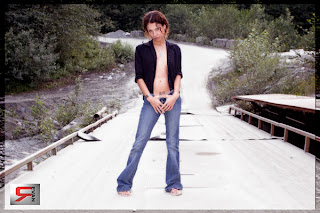Wednesday, February 18, 2009
News is the operative word
Reporter - n. a person employed to report news, etc. for newspapers or broadcasts.
When news happens in 100 Mile House and its surrounding area, residents expect their paper to cover it; the editor expects her reporters uncover the story; and those involved should expect to talk about it.
Some people forget that, not only are there those out there who make their living off of writing news articles, but the community relies on the paper to tell them what is going on and what to watch out for.
And when sources withhold information, they are being unfair to the paper and the public.
Small towns may not have the hard-hitting, intrusive sort of reporters larger cities have, but it doesn't mean rural community news matters any less.
So when something does happen, the involved parties in the news event are taken aback when they are approached by a reporter looking for answers.
Reporters represent the public and they will fight for their right to ask questions; granted, a person doesn't have to answer, but he or she can't silence the querying voice of the people.
Because sometimes "no comment" can speak louder than any words.
A town, its paper and authorities can work like a well-oiled information machine - it happens all the time.
Sympathy for the devil
"In the House" column from http://www.bclocalnews.com/bc_cariboo/100milefreepress/.
Like most fields, the world of journalism is a very competitive place.
The time it takes to break a story can be the difference between making or breaking a reporter. Even for a weekly, such as the Free Press, the pressure is still there since cyber stories are expected to be updated constantly.
But just because there is pressure on journalists does not mean they should throw their morals to the wind when writing a story — the photographers snapping up shots of Britney Spears in intimate moments like they are gold are not journalists.
People can’t paint all in the media with the same brush; just as politicians are not all lawyers, not all journalists are paparazzi.
The job of a reporter, in my eyes, is to inform the public and dispel rumours that may swirl around an incident.
I’m not nosy by nature, but I’m curious; nosy refers to being too interested in other people’s affairs; being curious means someone’s eager to know or learn something.
I do not feed off of the suffering of others; I do not live for a tragedy.
I, in no way, enjoy contacting someone who has just suffered a loss, but sometimes it’s the only way to understand and describe the whole story.
True reporting involves not just covering the news, but uncovering it. Uncovering a story does not
necessarily mean badgering people or digging up “dirt”; it may just mean describing an event from a different angle, talking about not just what happened, but why and how.
I’m not into eavesdropping or snooping around other peoples’ belongings or property; if I show up to a scene of a crime, it’s because I need to know — it’s not only my job as the editor of the paper, but there are more benefits than disadvantages in keeping the public informed.
When I show up to an event — crime, sports or otherwise — I’m not there to make trouble.
Especially in a small town, when people see a big fuss happening on their street, they start to talk; it’s human nature to wonder what’s going on.
It’s understandable when a matter is before courts, under investigation or involving an extremely sensitive issue, but when officials withhold all information and disclose nothing, it paves the way for rumour and speculation.
But a newspaper is not necessarily a public service; it is run by a company and needs to make its own independent funds. Unless it is a paid ad, a newspaper has no obligation to run or cover an event, story, etc.
My favourite part of a paper is the letters to the editor; whether a big city or small one-horse settlement, I read a paper’s top stories in the front then skip to the letters because nothing describes a town’s main issues better than its readers.
But, just like stories, not every letter makes it into print; depending on time frame and space constraints, some letters may have to wait or some will be cut all together. I do my best to get every letter in because, as I said, they’re important.
As for editorialized pieces, like what you’re reading right now, readers have to remember they are opinion; I know you may never agree with what I am writing, and might doodle horns on my head shot at times, and that’s fine.
If you don’t like what I’m saying then I welcome your letters.

